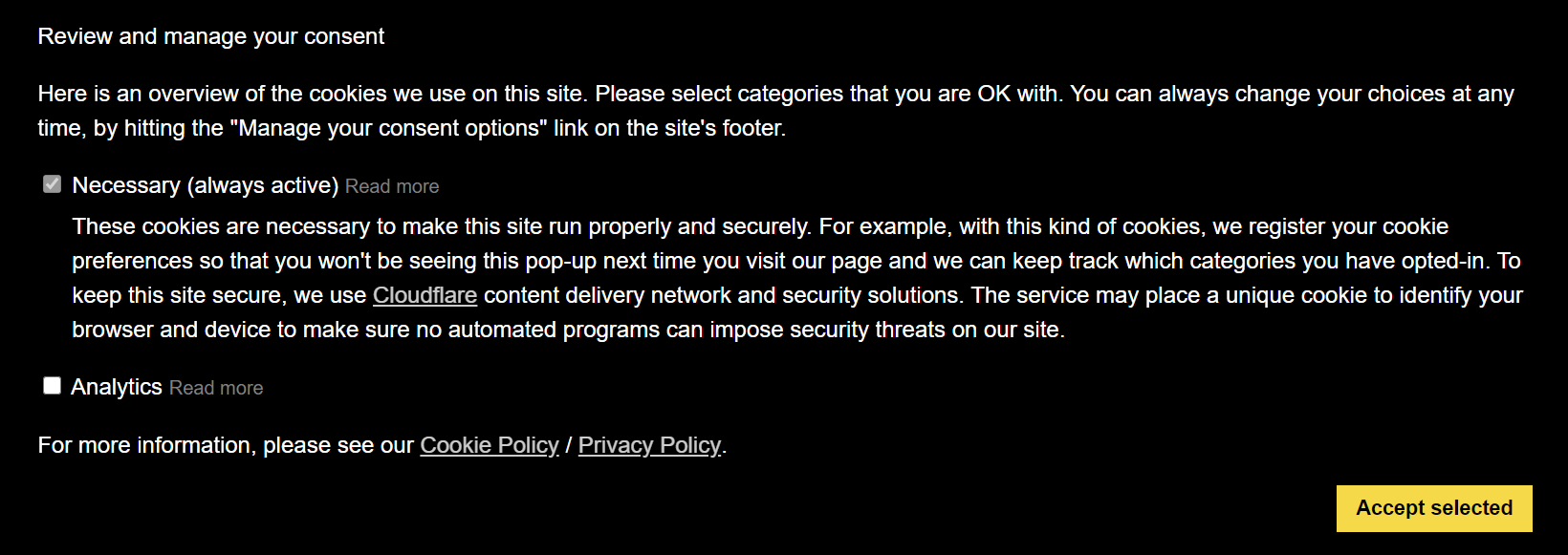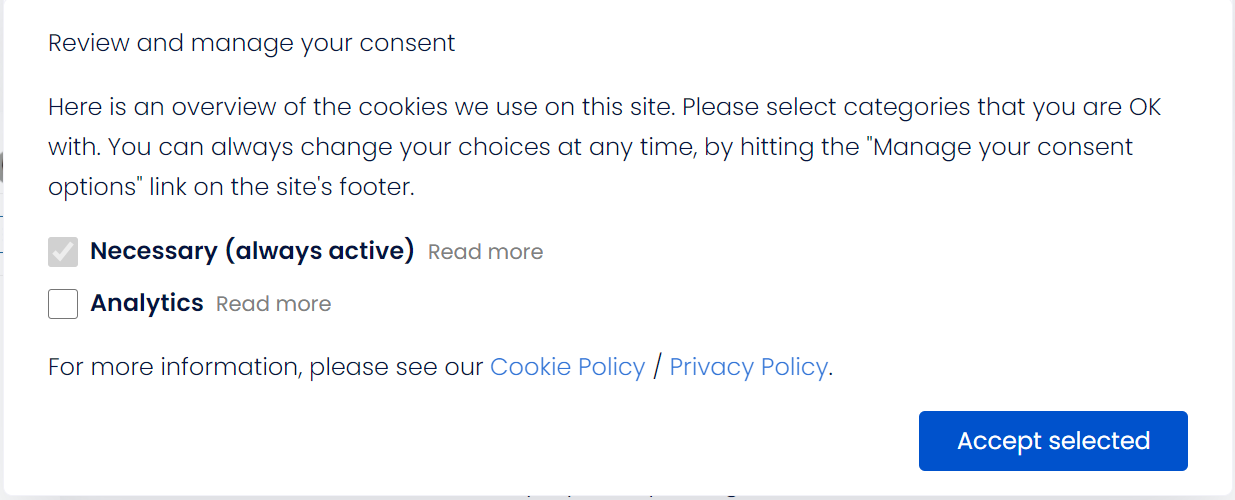Additional instructions for this fork from Sandstream Development
This fork introduces additional categories dialog which is shown after clicking the Customize settings button on the initial cookie consent dialog. It also adds few additional features to handle some GDPR concerns - please see below.
Check GDPR example to see it in action.
Installation
npm install @sandstreamdev/cookieconsent
# or via yarn
yarn add @sandstreamdev/cookieconsentUsage
Module
import { CookieConsent } from '@sandstreamdev/cookieconsent';
import '@sandstreamdev/cookieconsent/build/cookieconsent.min.css';
// or
const { CookieConsent } = require('@sandstreamdev/cookieconsent');
require('@sandstreamdev/cookieconsent/build/cookieconsent.min.css');Classic
const CC = window.CookieConsent;Additional configuration options
Categories
For showing only specific categories, the following options need to be set:
const cc = new CC({
//...options,
showCategories: {
[CC.UNCATEGORIZED]: false,
[CC.ESSENTIAL]: true,
[CC.PERSONALIZATION]: false,
[CC.ANALYTICS]: true,
[CC.MARKETING]: false
}
})The example above will only show essential and analytics categories.
Policies links
To wire the policies links mentioned in dialogs, please use the following options:
const cc = new CC({
//...options,
content: {
privacyPolicyLink: '/privacy-policy',
cookiePolicyLink: '/cookie-policy'
}
})Consent settings
As in GDPR, you need to provide the functionality to let the user change consents, so the consentSettingsElementId was added. It is the id of the element on the page that will reopen the categories dialog after clicking it.
const cc = new CC({
//...options,
consentSettingsElementId: 'btn-revokeChoice'
});
How to replace the default Read more texts for categories?
All or the desired subset of categories' read more text can be changed.
const cc = new CC({
//...options,
content: {
categoryAnalytics: 'My new awesome text for analytics category',
categoryEssential: 'My new awesome text for essential category',
categoryMarketing: 'My new awesome text for marketing category',
categoryPersonalization: 'My new awesome text for personalization category',
categoryUncategorized: 'My new awesome text for uncategorized category'
}
});How to set the Google Tag Manager (GTM) cookie only if the user has accepted analytics cookies?
Check GDPR example to see the solution.
It also handles scenario when user revoke their consent.
Styling with CSS
Styled version used in one of our projects:
And that's all from Sandstream Development. Enjoy!
What is Cookie Consent?
Cookie Consent is a lightweight JavaScript plugin for alerting users about the use of cookies on your website.
It is designed to help you quickly comply with the EU Cookie Law, CCPA, GDPR and other privacy laws. We made it fast, free, and relatively painless.
Cookie Consent is seen over 2 BILLION times every month and is used on millions of sites, making this by far the most popular consent project on the internet.
We welcome community contributions and actively review pull requests.
Hosted Zero Config Consent
Our parent company Osano actively maintains this open source project. Osano is a B-corp and is backed by millions of dollars in venture capital to create data privacy tools for the world. Our mission is to create transparency in data, please consider joining our team.
Ensuring that your website is compliant with various laws can be complicated. To effectively use any open source consent manager, you will need to do GeoIP lookups, adjust the consent types based on visitor location, callback and save consents in a database, and create callbacks to load scripts after consent is granted.
Osano offers a completely free hosted consent management platform, with additional features. If you have a high traffic website or need additional privacy tools, Osano offers paid plans as well. Unless you specifically need the open source tool, most website owners will be better served by the hosted version. If you use Osano for your business, please support continued development by purchasing a paid plan.
The hosted version of the cookie consent manager provides additional capabilities such as:
- Multi-lingual, translated into 38 languages and growing. Visitors automatically see the dialog in their browser or OS preferred language.
- Consents are stored automatically on the blockchain. REST API calls are available to developers to search and browse the consent records.
- 3rd party script blocking and loading does not require callbacks but is instead configurable from a dashboard providing developers with control over what the marketing team can enable or disable.
- Hosted on AWS Cloudfront with edges around the globe for
Basic Use
With version 4.0 you only need to attach the script as we've bundled everything together now. The initialization style has changed as have the callbacks (they're gone). Please see the text below to get started. Then, take a look at updated API via the docs.
Module
import CC from "CookieConsent"
// or
const CC = require( "CookieConsent" )
Classic
const CC = window.CookieConsent
Initialization:
const cc = new CC({
//...options,
type : "categories"
})
Lifecycle hooks, are now events:
cc.on( "initialized", ( ...args ) => console.log( args ) )
cc.on( "error", console.error )
cc.on( "popupOpened", () => console.log( "Popup Open" ) )
cc.on( "popupClosed", () => console.log( "Popup Closed" ) )
cc.on( "revokeChoice", () => console.log( "Popup Reset" ) )
cc.on( "statusChanged", ( ...args ) => console.log( args ) )
Version 4.0
Lots of updates & some breaking changes... but they're all for the better, we promise!
Version 3.1
Reflects the ownership change of the Cookie Consent project. Now actively maintained by:
- @arlogilbert
- @L0key
- @pgoforth
Version 3.0
Version 3.0 is a complete rewrite from version 2. The most substantial new features are:
- Ability to GeoLocate and only show the add-on to people in the relevant countries
- Callback hooks for showing/accepting/revoking the banner
- Support for different types of compliance, giving you the flexibility to obey even the strictest cookie laws
- Easy no-fuss themes and customisable styles
Installation
The easiest way to get up and running is to use our wizard.
You can also install this project through npm:
npm install cookieconsentOr through Yarn:
yarn add cookieconsent@3Or through Bower:
bower install cookieconsentOr via a jsDelivr:
<script src="https://cdn.jsdelivr.net/npm/cookieconsent@3/build/cookieconsent.min.js"></script>Documentation
See our full documentation.
Contributing
Feel free to improve the plugin and send us a pull request.
The easiest way to develop is to host the files with a local webserver. e.g.
python -m SimpleHTTPServerWe use Babel, Terser, and PostCSS to compile the SCSS and minify the JavaScript. You can run a build with:
npm run buildor
yarn run buildLegal Mumbo Jumbo
Osano is a registered trademark of Osano, Inc.
Nothing on the Osano website, platform, services, or software, nor any portion thereof constitutes actual legal or regulatory advice, opinion, or recommendation by Osano, Inc. or Osano International Compliance Services LTD.
If legal assistance is required, users should seek the services of an attorney.
Export Control
This distribution includes cryptographic software. The country in which you currently reside may have restrictions on the import, possession, use, and/or re-export to another country, of encryption software. BEFORE using any encryption software, please check your country's laws, regulations and policies concerning the import, possession, or use, and re-export of encryption software, to see if this is permitted. See http://www.wassenaar.org/ for more information.
The U.S. Government Department of Commerce, Bureau of Industry and Security (BIS), has classified this software as Export Commodity Control Number (ECCN) 5D002.C.1, which includes information security software using or performing cryptographic functions with asymmetric algorithms. The form and manner of this Apache Software Foundation distribution makes it eligible for export under the License Exception ENC Technology Software Unrestricted (TSU) exception (see the BIS Export Administration Regulations, Section 740.13) for both object code and source code.






